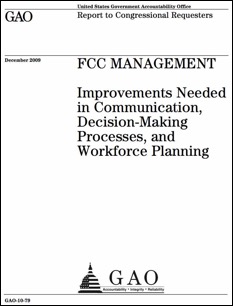GAO 12/09 Report on FCC Management
29 01, 10 15:33 Filed in: FCC Reform
 At the end of the 2009, GAO issued a report on FCC. This is yet another of the 100 reports they have written on FCC in the past decade. This report goes into a variety of topics so it will take more than 1 post to discuss them all. Due to the timing of the report (it was based on observations from August 2008 to October 2009), it deals mainly with what the new team inherited from its predecessors including some problems that actually go back decades.
At the end of the 2009, GAO issued a report on FCC. This is yet another of the 100 reports they have written on FCC in the past decade. This report goes into a variety of topics so it will take more than 1 post to discuss them all. Due to the timing of the report (it was based on observations from August 2008 to October 2009), it deals mainly with what the new team inherited from its predecessors including some problems that actually go back decades.From the summary, here are some of the issues that we shall discuss today:
- FCC lacks internal policies regarding commissioner access to staff analyses during the decision-making process, and some chairmen have restricted this access. Such restrictions may undermine the group decision- making process and impact the quality of FCC’s decisions.
- In addition, GAO identified weaknesses in FCC’s processes for collecting public input on proposed rules. Specifically, FCC rarely includes the text of a proposed rule when issuing a Notice of Proposed Rulemaking to collect public comment on a rule change, although some studies have noted that providing proposed rule text helps focus public input.
- Additionally, FCC has developed rules regarding contacts between external parties and FCC officials (known as ex parte contacts) that require the external party to provide FCC a summary of the new information presented for inclusion in the public record. However, several stakeholders told us that FCC’s ex parte process allows vague ex parte summaries and that in some cases, ex parte contacts can occur just before a commission vote, which can limit stakeholders’ ability to determine what information was provided and to rebut or discuss that information.
The report raises questions about the objectivity of technical analysis from my former OET colleagues:
On the first point the report does a good job comparing FCC with other regulatory commissions (FTC, FERC, and NRC)on the issues of the chairman’s relationship with the other commissioners. FTC and FERC, like FCC, have no explicit rule dealing with commissioner access to staff information, yet have had no problems. NRC’s legislation, though, has explicit provisions for information sharing. The report describes NRC’s procedures on commissioner access to information as:
• Requiring that draft and final analyses by NRC staff are simultaneously provided to all commissioners, including the chairman.• Establishing that each commissioner, including the chairman, has equal responsibility and authority in all commission decisions and actions, and has full and equal access to all agency information pertaining to commission responsibilities.
• Balancing commissioner access to staff analyses with the ability of the chairman to direct resource expenditures. For example, although individual commissioners can request information or analyses from NRC staff, if the request requires significant resources to fulfill and questions of priority arise, the office or the commissioner can request the chairman resolve the matter. If the chairman’s decision is not satisfactory to the requesting commissioner or the office, either can bring the matter for a vote before the full commission.
This is very different than recent practice at FCC.
On the NPRM issue, my former OET colleagues actually have probably the best record in the agency for including rules with NPRMs. I used to joke that the former Common Carrier Bureau produced NPRMs without rules and NOIs without questions.
Faithful readers will recognize the ex parte reform has been a recurring theme here. The Commission’s 10/28/09 workshop on these issues shows that these issues are getting top level attention although there has been no substantive action yet. Indeed, our 8/25/08 petition for review of the staff dismissal of an ex parte complaint still has not been acted on and remains totally “out of sight, out of mind” on the Commission’s present website.
We will talk soon about other issues in the report. I strongly recommend that you read it as it contains a wealth of useful background material.
blog comments powered by Disqus



![Validate my RSS feed [Valid RSS]](valid-rss-rogers.png)

